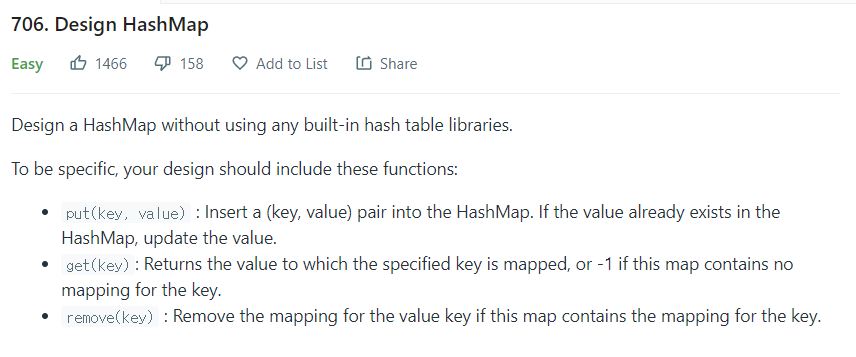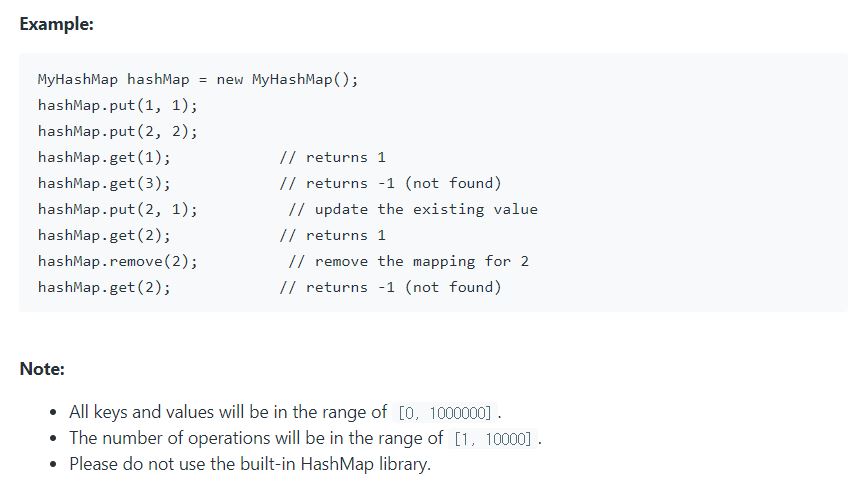leetcode(리트코드)3월07일 challenge706-Design HashMap
leetcode(리트코드)3월07일 challenge706-Design HashMap
leetcode March 07일 - Design HashMap 문제입니다.
1. 문제
https://leetcode.com/problems/design-hashmap/
2. Input , Output
3. 분류 및 난이도
Eazy 난이도입니다.
3월 07일자 챌린지 문제입니다.
4. 문제 해석
- 생각보다 어려웠습니다. Discuss를 참고하였습니다.
5. code
c++
1
2
3
4
5
6
7
8
9
10
11
12
13
14
15
16
17
18
19
20
21
22
23
24
25
26
27
28
29
30
31
32
33
34
35
36
37
38
39
40
41
42
43
44
45
46
47
48
49
50
51
52
53
54
55
56
class MyHashMap {
vector<list<pair<int,int>>> vec;
size_t vecSize = 10000;
public:
/** Initialize your data structure here. */
MyHashMap() {
vec.resize(vecSize);
}
/** value will always be non-negative. */
void put(int key, int value) {
list<pair<int,int>> &list = vec[key % vecSize];
for (auto & val : list) {
if (val.first == key) {
val.second = value;
return;
}
}
list.emplace_back(key, value);
}
/** Returns the value to which the specified key is mapped, or -1 if this map contains no mapping for the key */
int get(int key) {
const auto &list = vec[key % vecSize];
if (list.empty()) {
return -1;
}
for (const auto & val : list) {
if (val.first == key) {
return val.second;
}
}
return -1;
}
/** Removes the mapping of the specified value key if this map contains a mapping for the key */
void remove(int key) {
list<pair<int,int>> &pairs = vec[key%vecSize];
for(auto i=pairs.begin(); i!= pairs.end(); i++)
{
if(i->first==key) { pairs.erase(i); return; }
}
}
};
/**
* Your MyHashMap object will be instantiated and called as such:
* MyHashMap* obj = new MyHashMap();
* obj->put(key,value);
* int param_2 = obj->get(key);
* obj->remove(key);
*/
python
1
2
3
4
5
6
7
8
9
10
11
12
13
14
15
16
17
18
19
20
21
22
23
24
25
26
27
28
29
30
31
32
33
34
35
36
37
38
39
40
41
42
43
44
45
46
47
48
49
50
51
52
53
54
55
56
57
58
59
60
61
62
63
64
65
66
67
68
69
70
71
72
73
74
75
76
77
78
79
80
81
82
83
# using just arrays, direct access table
# using linked list for chaining
class ListNode:
def __init__(self, key, val):
self.pair = (key, val)
self.next = None
class MyHashMap:
def __init__(self):
"""
Initialize your data structure here.
"""
self.m = 1000;
self.h = [None]*self.m
def put(self, key, value):
"""
value will always be non-negative.
:type key: int
:type value: int
:rtype: void
"""
index = key % self.m
if self.h[index] == None:
self.h[index] = ListNode(key, value)
else:
cur = self.h[index]
while True:
if cur.pair[0] == key:
cur.pair = (key, value) #update
return
if cur.next == None: break
cur = cur.next
cur.next = ListNode(key, value)
def get(self, key):
"""
Returns the value to which the specified key is mapped, or -1 if this map contains no mapping for the key
:type key: int
:rtype: int
"""
index = key % self.m
cur = self.h[index]
while cur:
if cur.pair[0] == key:
return cur.pair[1]
else:
cur = cur.next
return -1
def remove(self, key):
"""
Removes the mapping of the specified value key if this map contains a mapping for the key
:type key: int
:rtype: void
"""
index = key % self.m
cur = prev = self.h[index]
if not cur: return
if cur.pair[0] == key:
self.h[index] = cur.next
else:
cur = cur.next
while cur:
if cur.pair[0] == key:
prev.next = cur.next
break
else:
cur, prev = cur.next, prev.next
# Your MyHashMap object will be instantiated and called as such:
# obj = MyHashMap()
# obj.put(key,value)
# param_2 = obj.get(key)
# obj.remove(key)
6. 결과 및 후기, 개선점
Discuss를 봤으므로 올리지 않습니다.
This post is licensed under CC BY 4.0 by the author.

